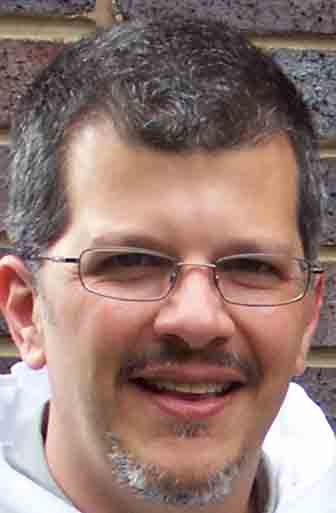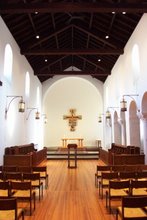"You are here" is the best possible advice for anyone starting to learn to pray. Praying is not a question of "succeeding" and "getting it right". It is not even about achieving anything. It is about drawing near to the love of God. And the love that prompts and draws us to pray is the same love that meets and embraces us when we do.
We are full of "shoulds" and "oughts" when it comes to the Christian life, and the awareness of what ought to be can become a millstone of condemnation around our necks. "Pray as you can and do not pray as you can't", says one spiritual guide, "Take yourself as you find yourself and start from there".
The great gift of God's love is that he allows us to start from exactly where we are, just as we are. And on the complicated map called Life, beside "YOU ARE HERE" and my big red arrow, is another message and another arrow, pointing right beside me, "I AM HERE TOO!"
- David Runcorn, A Center of Quiet; Hearing God When Life Is Noisy
Saturday, July 28, 2007
Wednesday, July 25, 2007
Retreat Reading
 Just started this one. Seems like real-life, down-to-earth theological reflection that stretches beyond the tired language of narrow evangelicalism. Longer review after I've read more deeply.
Just started this one. Seems like real-life, down-to-earth theological reflection that stretches beyond the tired language of narrow evangelicalism. Longer review after I've read more deeply.It does seem to me that the emerging church movement is discovering what monastics, especially Benedictines, have been saying and doing for over 1500 years!
June 25 - St. James the Apostle
 James the son of Zebedee and his brother John were among the twelve disciples of Our Lord. They, together with Peter, were privileged to behold the Transfiguration (M 17:1 = P 9:2 = L 9:28), to witness the healing of Peter's mother-in-law (P 1:29) and the raising of the daughter of Jairus (P 5:37 = L 8:51), and to be called aside to watch and pray with Jesus in the garden of Gethsemane on the night before His death (M 26:37 = P 14:33).
James the son of Zebedee and his brother John were among the twelve disciples of Our Lord. They, together with Peter, were privileged to behold the Transfiguration (M 17:1 = P 9:2 = L 9:28), to witness the healing of Peter's mother-in-law (P 1:29) and the raising of the daughter of Jairus (P 5:37 = L 8:51), and to be called aside to watch and pray with Jesus in the garden of Gethsemane on the night before His death (M 26:37 = P 14:33).James and John were apparently from a higher social level than the average fisherman. Their father could afford hired servants (P 1:20), and John (assuming him to be identical with the "beloved disciple") had connections with the high priest (J 18:15). Jesus nicknamed the two brothers "sons of thunder" (P 3:17), perhaps meaning that they were headstrong, hot-tempered, and impulsive; and so they seem to be in two incidents reported in the Gospels. On one occasion (L 9:54ff), Jesus and the disciples were refused the hospitality of a Samaritan village, and James and John proposed to call down fire from heaven on the offenders. On another occasion (M 20:20-23 = P 10:35-41), they asked Jesus for a special place of honor in the Kingdom, and were told that the place of honor is the place of suffering.
Finally, about AD 42, shortly before Passover (Acts 12), James was beheaded by order of King Herod Agrippa I, grandson of Herod the Great (who tried to kill the infant Jesus--Matthew 2), nephew of Herod Antipas (who killed John the Baptist--Mark 6--and examined Jesus on Good Friday--Luke 23), and father of Herod Agrippa II (who heard the defence of Paul before Festus--Acts 25). James was the first of the Twelve to suffer martyrdom, and the only one of the Twelve whose death is recorded in the New Testament.
James is often called James Major (= greater or elder) to distinguish him from other New Testament persons called James. Tradition has it that he made a missionary journey to Spain, and that after his death his body was taken to Spain and buried there. at Compostela (a town the name of which is commonly thought to be derived from the word "apostle", although a Spanish-speaking listmember reports having heard it derived from "field of stars", which in Latin would be Campus Stellarum). His supposed burial place there was a major site of pilgrimage in the Middle Ages, and the Spaniards fighting to drive their Moorish conquerors out of Spain took "Santiago de Compostela!" as one of their chief war-cries. (The Spanish form of "James" is "Diego" or "Iago". In most languages, "James" and "Jacob" are identical. Where an English Bible has "James," a Greek Bible has Iakwbos.)
- James Kiefer
Collect
O gracious God, we remember before you today your servant and Apostle James, first among the Twelve to suffer martyrdom for the Name of Jesus Christ; and we pray that you will pour out upon the leaders of your Church that spirit of self-denying service by which alone they may have true authority among your people; through the same Jesus Christ our Lord, who lives and reigns with you and the Holy Spirit, one God, now and for ever.
Saturday, July 14, 2007
Wednesday, July 11, 2007
July 11 Our Holy Father Benedict, Abbot and Founder
 Benedict was born at Nursia (Norcia) in Umbria, Italy, around 480 Ad. He was sent to Rome for his studies, but was repelled by the dissolute life of most of the populace, and withdrew to a solitary life at Subiaco. A group of monks asked him to be their abbot, but some of them found his rule too strict, and he returned alone to Subiaco. Again, other monks called him to be their abbot, and he agreed, founding twelve communities over an interval of some years. His chief founding was Monte Cassino, an abbey which stands to this day as the mother house of the world-wide Benedictine order.
Benedict was born at Nursia (Norcia) in Umbria, Italy, around 480 Ad. He was sent to Rome for his studies, but was repelled by the dissolute life of most of the populace, and withdrew to a solitary life at Subiaco. A group of monks asked him to be their abbot, but some of them found his rule too strict, and he returned alone to Subiaco. Again, other monks called him to be their abbot, and he agreed, founding twelve communities over an interval of some years. His chief founding was Monte Cassino, an abbey which stands to this day as the mother house of the world-wide Benedictine order.Benedict drew up a rule of life for monastics, a rule which he calls "a school of the Lord's service, in which we hope to order nothing harsh or rigorous." The Rule gives instructions for how the monastic community is to be organized, and how the monks are to spend their time. An average day includes about four hours to be spent in liturgical prayer (called the Divinum Officium -- the Divine Office), five hours in spiritual reading and study, six hours of labor, one hour for eating, and about eight hours for sleep. The Book of Psalms is to be recited in its entirety every week as a part of the Office.
A Benedictine monk takes vows of "obedience, stability, and conversion of life." That is, he vows to live in accordance with the Benedictine Rule, not to leave his community without grave cause, and to seek to follow the teaching and example of Christ in all things.
- James E. Kiefer
Almighty and everlasting God, whose precepts are the wisdom of A loving Father: Give us grace, following the teaching and example of your servant Benedict, to walk with loving and willing hearts in the school of the Lord's service; let your ears be open to our prayers; and prosper with your blessing the work of our hands; through Jesus Christ our Lord, who lives and reigns with you and the Holy Spirit, one God, for ever and ever.
Subscribe to:
Posts (Atom)













